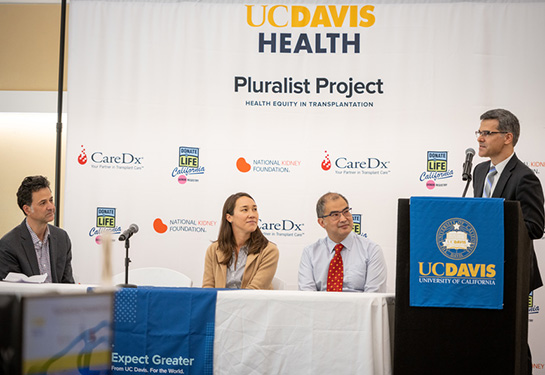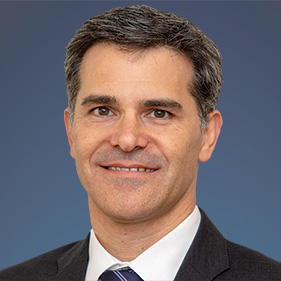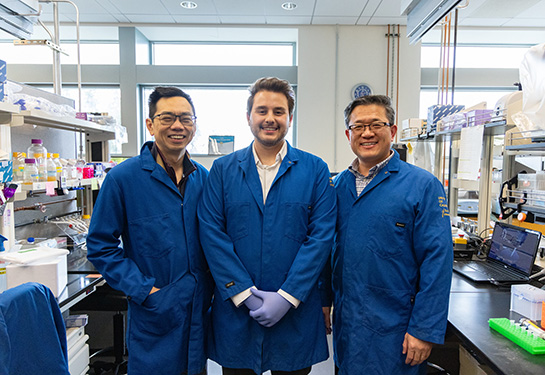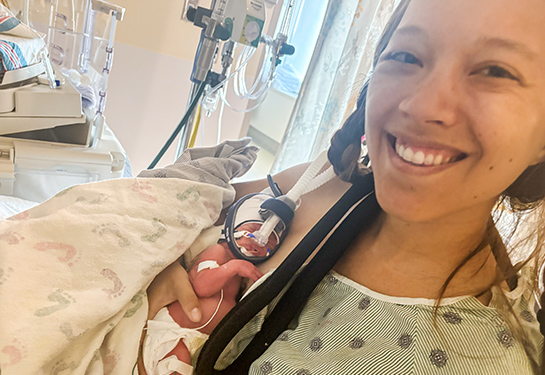Health equity summit to focus on disparities in organ transplants
As we approach National Donate Life Month in April, it is a time to look at the health inequities and opportunities that exist in the organ transplantation community.
At the second UC Davis Transplantation Health Equity Summit on April 14, community health care leaders will gather to discuss disparities in transplantation and strategize ways to improve the transplant system.
“Numerous studies have shown that members of our historically underserved communities are less likely to be placed on transplant waitlists and have a lower likelihood of transplantation," said Martin Cadeiras, medical director for the Advanced Heart Failure, Heart Transplantation and Mechanical Circulatory Support Device Program at UC Davis Health.
Across the country, more than 100,000 Americans are waiting for a heart, liver, lung, kidney, or pancreas. Of those waiting for a transplant, nearly 60 percent are a person of color and 29 percent are Black.
“Addressing this problem requires a multidisciplinary approach that challenges traditional interventions, which are currently falling short,” Cadeiras said. It is crucial we begin the conversation to tackle this obstacle to the well-being of all persons in all communities to create a movement that will reduce health disparities in organ transplantation.”
According to the Brookings Institute, communities of color have much higher rates of high blood pressure, diabetes, obesity, and heart disease, all of which increase the risk for kidney disease. Black Americans are almost four times more likely, and Latino Americans are 1.3 times more likely, to have kidney failure compared to white Americans. Despite the higher risk, Black and Latino patients on dialysis are less likely to be placed on the transplant waitlist and have a lower likelihood of transplantation.
“The path forward requires our commitment to transforming the conditions of historically marginalized communities, eliminating inequities in access to health care and enhancing allyship among racial and ethnic groups to address the disparities in organ transplantation,” Cadeiras added.
Every person deserves the opportunity for a full, healthy life. We must do our part to make sure that a patient’s ethnicity or economic status in no way limits the opportunity for extending and/or saving their life.” —Martin Cadeiras
What are we doing for transplantation equity?
Last year, UC Davis Health launched a new initiative, called “Pluralist,” to improve the organ transplantation system throughout California and work toward equity in organ donation.
The initiative, which stands for “patient centered precision digital health education,” is focused on increasing the availability of donor organs and access to life-saving surgery regardless of a patient’s socioeconomic standing.
“Every person deserves the opportunity for a full, healthy life,” said Cadeiras, who is the principal investigator of the Pluralist Program. “We must do our part to make sure that a patient’s ethnicity or economic status in no way limits the opportunity for extending and/or saving their life.”
Pluralist combines data and artificial intelligence to learn about the needs of the community and tailor proper education intervention using social networks and digital media to create greater organ donation awareness. Patient testimonials and interviews were used to create educational content that was shared among targeted communities throughout California to urge people to become donors, especially within communities of color.
Locally, the program is working with students at Valley High School's Health Tech Academy to discuss health equity. Students in the innovative public health program go through a rigorous college preparatory curriculum with advanced technology, student workplace experience and direct contact with local health agencies. Together these elements create a school-to-work educational experience for all students interested in health-related occupations.
Summit agenda
Topics for the annual conference include:
- Health equity case studies and best practices
- Health disparities in organ donation registration
- Opportunity for remote care to bridge the gap of health disparities
- Training the next generation of health care workers
Keynote speakers will be David Lubarsky, CEO of UC Davis Health; Art Torres, former member of the California State Legislature and vice chair of the Governing Board of the California Institute for Regenerative Medicine; and Beau Kelly, surgical director for Sierra Donor Services.
Register for the event on the virtual invitation. A virtual option is also available (registration required).






